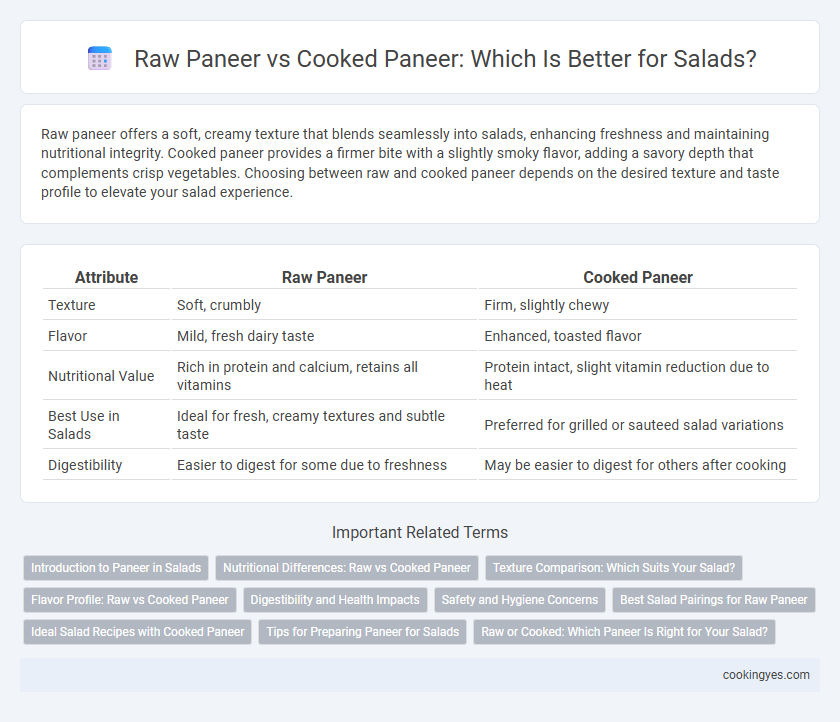Raw paneer offers a soft, creamy texture that blends seamlessly into salads, enhancing freshness and maintaining nutritional integrity. Cooked paneer provides a firmer bite with a slightly smoky flavor, adding a savory depth that complements crisp vegetables. Choosing between raw and cooked paneer depends on the desired texture and taste profile to elevate your salad experience.
Table of Comparison
| Attribute | Raw Paneer | Cooked Paneer |
|---|---|---|
| Texture | Soft, crumbly | Firm, slightly chewy |
| Flavor | Mild, fresh dairy taste | Enhanced, toasted flavor |
| Nutritional Value | Rich in protein and calcium, retains all vitamins | Protein intact, slight vitamin reduction due to heat |
| Best Use in Salads | Ideal for fresh, creamy textures and subtle taste | Preferred for grilled or sauteed salad variations |
| Digestibility | Easier to digest for some due to freshness | May be easier to digest for others after cooking |
Introduction to Paneer in Salads
Raw paneer offers a soft, creamy texture that absorbs salad dressings well, enhancing the freshness of ingredients like cucumbers and tomatoes. Cooked paneer, whether grilled or sauteed, provides a firmer consistency with a smoky flavor, making it ideal for warm salads or those with robust dressings. Both forms enrich salads with high-quality protein and calcium, supporting a balanced, nutritious meal.
Nutritional Differences: Raw vs Cooked Paneer
Raw paneer retains higher levels of heat-sensitive nutrients such as vitamin B12 and certain antioxidants, making it nutritionally richer for salads. Cooked paneer, while slightly lower in these vitamins, offers enhanced protein digestibility and a softer texture that blends well with salad ingredients. Both forms provide substantial amounts of calcium and protein, but raw paneer maximizes vitamin retention useful in fresh salad preparations.
Texture Comparison: Which Suits Your Salad?
Raw paneer offers a soft, crumbly texture that absorbs salad dressings well, providing a creamy mouthfeel ideal for fresh, light salads. Cooked paneer, especially when grilled or sauteed, develops a firmer, slightly chewy texture with a golden crust, adding a contrast that enhances hearty or warm salad varieties. Choosing between raw and cooked paneer depends on desired texture balance; raw paneer complements crisp vegetables while cooked paneer adds depth and bite.
Flavor Profile: Raw vs Cooked Paneer
Raw paneer offers a mild, creamy flavor with a subtle sweetness that enhances fresh salad ingredients without overpowering them. Cooked paneer develops a richer, nuttier taste and a firmer texture, adding depth and a slightly smoky character to salad dishes. The choice between raw and cooked paneer depends on whether a delicate or more robust flavor profile is desired in the salad.
Digestibility and Health Impacts
Raw paneer retains more natural enzymes and nutrients, enhancing digestibility and providing probiotics that support gut health. Cooked paneer, while softer and easier to chew, may lose some heat-sensitive vitamins but offers improved protein availability and reduced risk of bacterial contamination. Choosing raw paneer for salads maximizes nutrient intake, whereas cooked paneer ensures safer consumption and better protein assimilation.
Safety and Hygiene Concerns
Raw paneer in salads poses higher safety and hygiene risks due to potential contamination from pathogens if not stored or handled properly. Cooked paneer eliminates many bacteria, making it a safer option for consumption in salads, especially when freshness is uncertain. Ensuring paneer is sourced from hygienic suppliers and stored at appropriate temperatures further reduces the risk of foodborne illness.
Best Salad Pairings for Raw Paneer
Raw paneer offers a mild, creamy texture that pairs well with fresh, vibrant salad ingredients like cucumbers, tomatoes, and bell peppers, enhancing the dish's natural flavors without overpowering them. Its soft consistency complements leafy greens such as spinach and arugula, creating a balanced mouthfeel and adding a protein boost ideal for light, nutritious salads. Combining raw paneer with herbs like mint and cilantro, along with a tangy lemon dressing, elevates the salad's freshness and delivers a satisfying, wholesome meal.
Ideal Salad Recipes with Cooked Paneer
Cooked paneer enhances salad textures and flavors by adding a warm, slightly crispy element that contrasts well with fresh vegetables and leafy greens. Ideal salad recipes with cooked paneer include dishes like grilled paneer salad with bell peppers, cucumbers, and a tangy vinaigrette or spicy paneer tikka salad combining roasted paneer cubes with tomatoes and onions. Cooking paneer also improves its digestibility and allows it to absorb spices and dressings better, making the salad more flavorful and satisfying.
Tips for Preparing Paneer for Salads
For salads, raw paneer offers a soft, creamy texture that absorbs dressings well, enhancing each bite with a fresh flavor. Lightly cooking paneer by grilling or pan-frying creates a firmer texture and smoky taste, adding depth and contrast to the salad. To prepare paneer for salads, drain excess moisture by pressing it gently and cut into uniform cubes for even distribution and an appealing presentation.
Raw or Cooked: Which Paneer Is Right for Your Salad?
Raw paneer offers a soft, creamy texture and mild flavor that pairs well with fresh salad ingredients, preserving its natural richness and moisture. Cooked paneer, often grilled or sauteed, adds a firmer texture and smoky, caramelized notes that enhance the overall taste and provide a satisfying bite. Choosing between raw and cooked paneer depends on the salad's flavor profile and desired texture, with raw paneer ideal for light, fresh salads and cooked paneer suited for hearty, robust combinations.
Raw Paneer vs Cooked Paneer for salads Infographic

 cookingyes.com
cookingyes.com